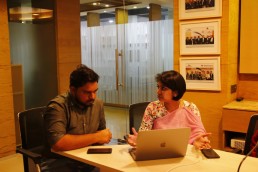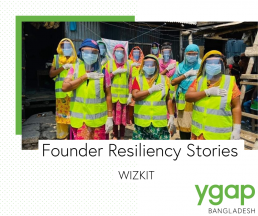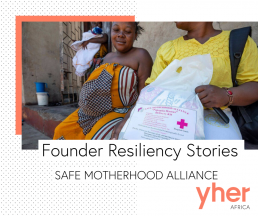Venture Recovery Stories: Robofun
Venture Recovery Stories: Robofun
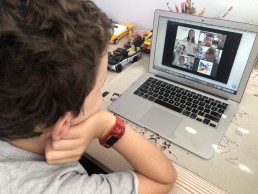
Transitioning to online learning has been both challenging and rewarding for Robofun
Robofun designs and runs tailored workshops to inspire and attract primary school girls to participate in STEM and familiarise young boys to work with girls in the lab. The programs offered cover coding, robotics and 3D design at multiple levels. In light of COVID-19, Robofun was able to reimagine its services to the online world by running virtual classes during the school holidays.
Lina Qasem, founder and managing director of Robofun said, “We’ve had to improvise in order to ensure our classes continue to run. This required us to pivot our business model to allow for 100% online remote and interactive learning. While it was very challenging to execute in such a short period of time, the feedback has been great, and we know parents needed this service.”
The ygap First Gens team spoke with 2018 First Gens alumni and founder of Robofun, Lina Qasem about some of the challenges and opportunities arising from the pandemic, how ygap has supported Robofun through the re-accelerator and Robofun’s vision for a world beyond COVID-19.
What are some of the challenges you have faced during COVID-19, in general as an entrepreneur and as a business?
As a business, we previously had lots of partnerships with places such as libraries, schools, museums etc. However, as a result of the pandemic, many of these places closed and we were unable to run our workshops in person.
As an entrepreneur, it can be challenging trying to run a business from home whilst looking after a family and I experienced many pressures as a result of that. I had to change our business model completely and this was hard. However, with the support of my team, I was able to figure out the priorities for Robofun and focus on our online workshops and to postpone our partnerships to ensure our online workshops are successful.
How has your business changed or evolved due to COVID-19?
Robofun has quickly pivoted by moving our physical workshops to an online format. We couldn’t do the robotix classes in person so we had to pivot online and find the best software to simulate our robotix classes.
Some parents weren’t comfortable or familiar with registering their kids to participate online. However, after 1-2 months, our classes became full as parents became used to online learning and registered their kids to participate in our workshops.
We changed the format by offering our partner schools and libraries with different options for online classes with various prices to make it flexible for them. As we understand that it is a challenging time for many businesses, we also began offering promotional discounts for our partners to access our workshops. For example, if you buy two classes, you get one free.
Additionally for parents, we also offer one- off classes so they don’t have to purchase or register for bulk classes.
In your own opinion, what is the most significant change that took place with your venture in the past 3 or 6 months?
I’m happy because the most significant change to Robofun is that now we are offering classes globally. We have children from Japan, children from the United Arab Emirates and from different states around Australia. Before, we used to only offer classes to Melbourne, now we can offer our program to everyone.
Why was this particular change the most significant to you?
This change is most significant because it will increase our impact to reach more girls around the world to learn and engage with STEM. Most kids who have registered are girls. This is great because we have access to a bigger market and most children who participated in our workshops have provided positive feedback.
When we reach more kids and increase our impact, this will help us to run more workshops and hire more people to run them and increase employment opportunities.
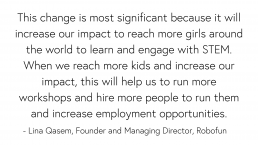
What role has ygap played in those changes and / or what are some outcomes your venture has achieved as a result of being supported by ygap and/or participating in the re-accelerator?
ygap has been so supportive and with their immediate help, we were able to go through this journey confidently. In the beginning, when we’re juggling different things, it’s good to have someone to hold you accountable, to let you know that we’re on the right track and to provide reassurance. During the re-accelerator, for the financial session, it helped me a lot and I found it useful because it showed me how I can minimise costs and increase my impact without spending more money. I also found the marketing session useful to promote our online classes and show to our audience that we’re still operating.
The re-accelerator helped us to not feel alone and helped us to see other ventures are going through a challenging time too. We felt supported.
How do you see these outcomes improving your venture over the next 6-12 months?
These outcomes can help my venture in going ahead confidently, knowing there is a supportive team who I can rely on for any help. The next six months are uncertain, however, I know that we’ve gone through the worst and now, it’ll be easier to get through it with a supportive team and supportive coaches to ask for help.
What does the future of your venture look like post COVID-19?
Robofun will keep offering our classes globally. We will keep running online classes and hopefully it’ll be the first option for anyone who is interested in learning about STEM.
What are the key ingredients for successfully overcoming challenges?
Consistency, perseverance, keep trying and keep going until it works and being willing to ask for help. Also, believe in yourself and if you have this passion towards your venture, you will be able to overcome challenges, and keep focused. To keep focused, you need to stay motivated and find what keeps you motivated.
What is your advice to other entrepreneurs in regards to adapting/coping during a pandemic?
Just ask for help and stay motivated. Motivation will keep you going and wanting to give back to the community. Also look after yourself so you can give back to the community.
How likely are you to recommend other early-stage impact entrepreneurs to look to programs like the one ygap has run for support to help grow their ventures? Also why?
I can confidently recommend such a program, because ygap has been really helpful and has a supportive community to help you to keep moving forward and develop the confidence to know what you’re doing and go on the right track.
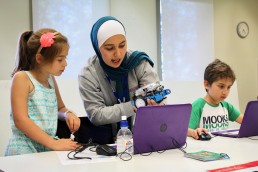
Robofun is making STEAM education accessible and fun. For more information, check here: https://www.robofun.com.au
Robofun is a ygap First Gens alumni, and recently completed the ygap Re-Accelerator Program, designed to support ventures through the effects of COVID-19.
Call for Nation
ygap Bangladesh Supports Government Entrepreneurship Initiative
“Life’s most persistent and urgent question is, ‘What are you doing for others?’”
– Martin Luther King, Jr.

As Bangladesh grips into fighting the catastrophic impacts of the Coronavirus, the crisis has led the Country and its People to battle the pandemic collectively as a Nation. In April 2020, The ICT Ministry of the Bangladesh Government launched their initiative “Call for Nation” in partnership with YGAP Bangladesh as the knowledge partner, to promote and support ideas and business solutions from talented and innovative entrepreneurs to address the challenges ensued from Covid-19. The initiative was inaugurated by the honourable Minister of State for Information and Communication Technology Division of Bangladesh, Mr. Zunaid Ahmed Palak.
YGAP Bangladesh played a crucial role to aid the Government to bring this idea to execute the initiative successfully. YGAP Bangladesh co-designed the selection process of the applications as well as developed the selection criterion based on which the top finalists would be selected. We also co-designed the coaching sessions for the top finalists and were advisors to the Government for the Jury Selections where we advised and provided our expert opinions on which industry leaders would be appropriate to take on the role of a Jury Member in accordance to the categories of applications. We also co-designed and set the KPIs for both Coaches and Jurors to ensure progress from both sides.
The program was executed entirely digitally in multiple phases. A total of 680 start-up applications were pre-screened to shortlist the top 70 applicants using the selection criterions: Viability of Business, Potential for Impact and Alignment, Scalability, Team and Innovative Approach. These 70 applicants were then provided 1:1 coaching from 18 handpicked coaches by the Government which included Mr. Erad Kawsar, Country Director of YGAP Bangladesh. Following the coaching sessions, we conducted a deep-analysis of the start-ups and aided the second screening for the selection where the top 20 finalists were selected for their Live Pitch sessions on Facebook. Subsequently, we provided coaching to the 5 of the top 20 finalists who are working to respond to social and industrial needs in Risk Management, Healthcare, Employment Creation and Communication sectors. Our one-on-one coaching with the top 5 finalists revolved around supporting the entrepreneurs to strengthen their business model to ensure sustainability and their presentation skills for their live pitch sessions online.
We further aided the judges to make informed decisions through our data metrics and expert opinions of the start-ups who had applied to select a winner from each of the 6 categories, which are:
- Socioeconomically disadvantaged population – Total 102 Applications
Winner: Shujog – a virtual operational network which strengthens the existing Relief Management system to support the disadvantaged marginalised population.
- Business operation & production – Total 82 Applications
Winner: Landknock – A low-cost digital grocery management platform for the micro and small retailers to enable them to sell online.
- Health care equipment & treatment – Total 158 Applications
Winner: PAPR – A low cost PAPR system (Powered air-purifying respirators) which provides maximum protection against virus, bacteria and contaminated environments to its users.
- Access to information – Total 133 Applications
Winner: Nirapod – An online monitoring and management system to aid the Government of Bangladesh to monitor home-quarantined patients. They also have a supporting app for people who are in home-quarantine to inform the authority that they are following their quarantine as advised.
- Mental Health – 39 Applications
Winner: Moner Bondhu – A digital mental healthcare and well-being platform, providing counselling, conducting workshops and group sessions, conducting research projects and raising awareness through online content, radio show, TV show and campaigns. They were also part of YGAP Bangladesh’s UNDP Youth Co:Lab 2.0 Mentorship program where we supported them to strengthen their business from multiple dimensions to ensure scalability and survivability.
- Open ideas – 86 Applications
Winner: Long Distance Disinfection Services – Using Remotely Piloted Vehicles (Ground Robots and Drones), LDDS provides disinfection in locked down areas to provide rapid/continuous disinfection.
To scale and develop their business, as the winners, they received:
- Seed funding/Funds to scale up
- Support to avail resources required to successfully build their products/services
- Bridging with other large-scale enterprises/entrepreneurs
- Opportunity to showcase their winning solutions on Oracle Cloud Platform in Oracle Event/Seminar.
The winner with the most impactful business will also receive further mentorship support from YGAP Bangladesh.
These heroes are now helping the Government fight the pandemic and protect the Nation’s people from the deadly pandemic. We salute these heroes for their resilience and dedication to help their Country.
“The best thing I did was to choose the right heroes”
– Warren Buffet, CEO, Berkshire Hathaway
– Written by ygap Bangladesh Country Director, Erad Kawsar, and ygap Bangladesh Program Manager Mehrab bin Tarek
Founder Resiliency Stories: Wizkit
Founders Resiliency Stories:
Wizkit
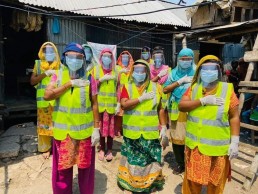
Bangladesh front-line workers wearing protective face masks manufactured by Wizkit.
In Bangladesh, there is a significant lack of basic medical equipment and protective gear for the country’s healthcare and front-line personnel to help fight and protect against COVID-19.
In response, ygap Bangladesh alumni venture, Wizkit, has connected with an international community of open source COVID-19 technology and have worked to recreate those designs in Bangladesh. Repurposing its product development and research teams, Wizkit is now 3D printing face shields, ear savers and have started to prototype a quick emergency ventilator.
“Our 3D printed face shields have now helped 1700 doctors and front line personnel to stay safe. 500 more are rolling out as we speak. Additionally, each day we are averaging printing 120 face shields and ear savers to support medical professionals” ygap Bangladesh alumni and Wizkit co-founder, Mushfiqur Rahman Saad, said.
The ygap Bangladesh team spoke with Wizkit’s co-founder, Mushfiqur Rahman Saad about the impact of the pandemic on their venture, how they are responding, and their vision for a world beyond COVID-19.
How has COVID-19 affected Wizkit?
Due to COVID-19, all our activities which required a heavy amount of logistical support initially stopped to a halt. Our research team had a difficult time initially adapting to not being able to work together in a single space with their equipment, and this directly impacted our sales and revenue. Our production and research involves a lot of moving around with materials and contents, so all our logistic functions were temporarily stopped.
What support is Wizkit providing to those affected by COVID-19?
After the initial shock we decided we wanted to help in any way we could. We connected with an international community of open source COVID-19 technology and worked to recreate those designs here in Bangladesh. Doctors and emergency personnel in Bangladesh lack basic medical equipment and protective gear, so we started 3D printing face shields, ear savers and started to prototype a quick emergency ventilator.
Our 3D printed face shields have now helped 1700 doctors (free of charge) and front line personnel to stay safe. 500 more are rolling out as we speak. Additionally, each day we are averaging printing 120 face shields and ear savers to support medical professionals. Our ventilator is also entering medical trials and we have ramped up all of our production capacity sixfold from the time we started.
All our 3D printed and other materials are now being sold at a fraction of any low end alternative in the market with a minimal margin to keep operations running. We have also created custom disinfection chambers that are now being set up across multiple factories (with a huge amount of employees, like RMG factories) and hospitals around Bangladesh for instant disinfection.

What are the key ingredients for overcoming challenges?
For us what worked best is our personal sources and very strong supply chain which was able to serve us despite a complete lockdown. It also helps to keep the team completely focused on a “problem-solving” mentality all the time, that way everyone is always on board with what’s happening and how they can be handled.
How have you been able to adapt so fast in the face of a pandemic?
Our team believed that we could help. We used all of our resources from every possible place and person, everything at hand and used the international open source communities as a way to inspire action. Well-trained employees who believe in our mission (to make lives better), as much as I do as a co-founder, keep the team trying out new ideas and keep them going even from home.
What does a post COVID-19 world look like for Wizkit?
Post COVID-19, we would like to make a few changes within the organization, so that we can be better prepared for any such future emergencies. Additionally post COVID-19 our venture will thrive with an even stronger supply chain. but in general our venture was made to adapt fast and so that in its core will remain the same.
Wizkit is an educational technology company empowering youth involvement in STEM through research, innovation, product development and training. For more information, check out Wizkit’s website here: https://www.wizkit.org/
Wizkit was a participant in the ygap Bangladesh 2016 Program.
Founder Resiliency Stories: Safe Motherhood Alliance
Founders Resiliency Stories:
Safe Motherhood Alliance
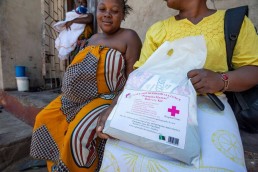
A family in Zambia holds one of Safe Motherhood Alliance’s baby delivery kits.
COVID-19 has shown its potential devastating impact around the world, but it is a particular cause for concern throughout Africa as it could have disastrous impacts on the continent’s already strained health systems, quickly turning into a social and economic emergency.
In response, yher Africa alumni venture Safe Motherhood Alliance is continuing to manufacture and distribute emergency baby delivery kits for home births while also pivoting to manufacture 3D printed face masks and visors, and distributing other essential medical supplies across COVID-19 hot-spot zones throughout Zambia.
“Our target is to distribute 5,000 baby delivery kits to 5,000 pregnant women and train 100 traditional birth attendants during this period as part of our ongoing services as COVID-19 puts an already overburdened health system under immense pressure.” yher Africa alumni and Safe Motherhood Alliance’s CEO, Muzalema Mwanza remarked.
The yher Africa team spoke with Safe Motherhood Alliance’s CEO, Muzalema Mwanza about the impact of the pandemic on their venture, how Safe Motherhood Alliance is providing emergency maternity care and distributing health products for expecting mothers across Zambia, and their vision for a world beyond COVID-19.
How has COVID-19 affected Safe Motherhood Alliance?
Due to COVID-19 being highly infectious, obstetric providers are having to reinvent maternity care in real time to protect the mother, baby as well as themselves. As face-to-face encounters in health facilities are being discouraged, it’s more important than ever to ensure the safety of the mother, the newborn and especially health personnel to avoid transmissions of the virus to newborns during childbirth in resource-constrained areas. Last mile health services in current situations are usually underfunded and under-resourced, leaving the virus to spread easily in these communities, and pregnant women are more at risk. The health facilities do not have enough face masks and visors to prevent the spread in the already overburdened health facilities. From what we’ve seen with the incubation of the virus, symptoms start when one has already become infectious to the general population.
With our work in the field, we are seeing in real time how health personnel and some of our own staff members do not have adequate supplies of PPE. We have realized that we have a deficit of masks to the point that medical personnel are also at risk of contracting the virus and are concerned about the burden they will bear in the next few months when the crisis reaches its peak.
What support is Safe Motherhood Alliance providing to those affected by COVID-19?
Zambia, as with the rest of the world, is ill prepared for this crisis with a deficit of face masks, ventilators and mass testing that could help mitigate this crisis before it reaches its peak. In addition, COVID-19 dangerously affects pregnant women which is our area of expertise as our organization is responsible for ensuring that pregnant women have a safe childbirth.
Our focus on pregnant women and trained birth attendants during the COVID-19 pandemic is vitally important because experience tells us that during health crises like the spread of the coronavirus: women are more likely to be infected, given their roles as caregivers and frontline healthcare workers (70% of them are women) and sexual and reproductive health resources are diverted, contributing to higher maternal mortality rates.
in response, we are raising funding that will help us procure medical supplies of essential products for the readiness package to be deployed across the COVID-19 hot-spot zones and epi-centre in Lusaka, the capital city of Zambia, to train more frontline health workers already in our database. We will ensure they have adequate PPE and emergency kits for home births specifically for the baby delivery kit that includes medical supplies such as sterile gloves, surgical blades and delivery mats, and manufacturing 3D printed face masks and visors locally in Zambia to reduce costs and mitigate disruption to our supply chain.
We also intend to provide contact tracing in communities for those who test positive for COVID-19 especially for post-birth analysis in pregnant women. This is a practical solution that can be managed locally, relieving pressure from national facilities who would struggle to cope under sustained pressure. Our target is to distribute 5,000 baby delivery kits to 5,000 pregnant women and train 100 traditional birth attendants during this period as part of our ongoing services as COVID-19 puts an already overburdened health system under immense pressure.

What have been the challenges you’ve faced?
One of the challenges we have faced during this period is finding resources and funding for our business to adapt quickly enough to COVID-19 as it is moving at an exponential rate. This is a concern because we know that pregnancy changes the immune system of the woman making her more vulnerable to infectious diseases, hence more susceptible to a virus of COVID-19’s nature. So we want to work quickly.
Our primary customers, who are pregnant women are depending on us even more now with travel restrictions, social distancing and other issues brought on by the pandemic, so we want to ensure we are able to support them during this process. Pregnant women are being advised not to go to the health facilities, because of COVID-19 for safety and are encouraged to have home births. However, without access to sterile tools and a trained birth attendant, we could see the number of neonatal and maternal mortalities start to rise in the coming months or weeks.
What are the key ingredients for successfully overcoming challenges?
One of the key ingredients for successfully overcoming challenges is having a strong sense of why you are doing something, because that is what will hold you to be steadfast even when things are not going your way. Also, realising that success is a process and not an event, that way you are continuously learning and growing as an entrepreneur and a leader in your organisation. But first you have to learn to lead yourself, into the right spaces, to make the right decisions for yourself, because no one knows better than you what you need to succeed and you have it all inside you. You just have to believe in yourself and your abilities.
How have you been able to adapt so fast in the face of a pandemic?
From the onset of the COVID-19 pandemic and when I saw the devastating effects it had on the rest of the world, I realised that this was the new normal and we had to adapt to it. So we set in motion, a clear road map of how we wanted to do that and reached out to our partners so they knew what we were planning. So planning and reacting to the situation accordingly did help and, of course, there were times when I felt that it was all too much especially hearing the stories of what was happening around us. But that’s where we need a good support system who knows and knows your strengths and weaknesses so that you can depend on that system in times of uncertainty.
What does a post COVID-19 world look like for Safe Motherhood Alliance?
We are continuing to work during the pandemic delivering our health services and are hopeful that we will continue to do so for a long time, because the need is still there and heightened now due to COVID-19. We are working on ways to deal with it and take care of our staff, families, customers and communities. Despite all the bad news that we hear about the pandemic, there are also stories of hope, stories of people coming together and finding their “Ubuntu” and joining hands to help a neighbour struggling with something or even a complete stranger because they recognise that “this too shall pass”. And yes, the numbers of those we have lost to the pandemic keep rising everyday, but I am optimistic about the future of humanity. So I know our venture will adapt or even pivot to ensure it is future ready proof and we will continue serving the mothers out there, because we are here to support them during pregnancy and childbirth to have healthy babies.
Safe Motherhood Alliance develops and distributes health products to pregnant women from low-income communities and rural areas. We also train and equip local women from the communities who are traditional birth attendants to serve as frontline health workers.
Visit Safe Motherhood Alliance website here.
Safe Motherhood Alliance was a participant in the yher Africa 2018 Program.
Founder Resiliency Stories: Project Trishna
Founders Resiliency Stories:
Project Trishna
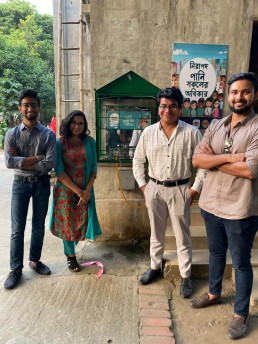
Founders of Project Trishna, an initiative of the Footsteps Foundation
The spread of COVID-19 and the associated government response in Bangladesh has resulted in millions of people becoming unemployed with marginalised community groups such as poor women and other minorities being most impacted.
In response, ygap Bangladesh alumni venture, Project Trishna, initiated an emergency relief response, providing relief packages including essentials such as rice, lentils, salt, cooking oil, potatoes and antiseptic soap, specifically for the most marginalised members within society. Already 157 individuals and 571 families across 13 unions have accessed these much-needed relief packages who would not otherwise receive any other support.
“One of the communities in Khulna City reached out to us two weeks after their aid distribution to refer to nearby communities that needed help, and actively came forward to engage in aid distribution efforts because after seeing our response, they were inspired to do their part for their community” said the team of Project Trishna, an initiative of the Footsteps Foundation Bangladesh.
The ygap Bangladesh team spoke with the team of Project Trishna about the impact of the pandemic on their venture, how they are responding and their vision for a world beyond COVID-19.
How has COVID-19 affected Project Trishna?
Due to COVID-19, almost all of Project Trishna’s activities have had to be put on hold.
It has been impossible to carry out regular monitoring of our site and installations, as well as servicing visits by our logistics teams. Due to schools being declared closed until September 2020 by the government, our existing systems will remain unused till the end of that period.
The closure is hindering our scope for new implementations and has put businesses into an uncertain economic period, thereby reducing our scope of prospective CSR (Corporate Social Responsibility) partners.We have also been unable to import system components as these products are imported from Taiwan and China. Finally, our revenue sources have dried up and our runway is decreasing given our current burn rate and lack of new income.
What support is Project Trishna providing to those affected by COVID-19?
We introduced an emergency relief response at the beginning of the lockdown in Bangladesh. This was to address the number of essential workers who did not have access to work throughout the lockdown period and could not afford basic food for themselves and their families. This support was provided to communities who are under the scope of Project Trishna, as well as low-income communities outside Dhaka. We focused on the highly marginalised and stigmatised members of society who were being overlooked by mainstream aid distributions efforts. This included women in prostitution and members of the LGBTQ+ and Hijra communities. We provided food packages containing rice, lentils, salt, cooking oil, potatoes, and a bar of antiseptic soap.
This is important because most of Bangladesh’s labour force is suffering due to lack of work and cannot access essentials such as food and soap. As we are unable to carry out operations in terms of Project Trishna, we have opted for an emergency response and thus far have reached 157 individuals and 571 families across 13 unions (administrative geography) .
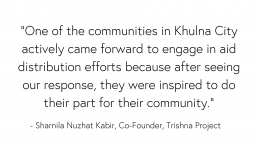
What have been the challenges you’ve faced?
As an entrepreneur, the uncertainty surrounding business, job and income security are some of the challenges I’ve faced. As a business, and in relation to our COVID-19 response, it has been hard to mobilise due to lockdown, insufficient donations and insufficient knowledge.
What are the key ingredients for overcoming challenges?
Our key ingredients are embracing self-awareness regarding the crisis and crisis response, using time to our advantage in thinking out of the box or remodelling approaches, implementing a discipline oriented approach towards uncertainties and unforeseen future and engaging in creativity, exploring new methods, and spending time on creative solutions.
How have you been able to adapt so fast in the face of a pandemic?
Coordination and cooperation from the team, with all hands on deck. We have been able to brainstorm and creatively adapt to the scenarios as it happened.
What does a post COVID-19 world look like for Project Trishna?
For Project Trishna, community-based mobilisation is essential in achieving project outputs and long term outcomes. While the government has ramped up hand-oral hygiene (in light of COVID-19), access to clean drinking water is still a problem. Our project stance will now look into developing new community guidelines in our post-crisis activities.
Project Trishna supports the Bangladesh government’s commitment towards SDG 6, particualry SDG 6.1, access to safe drinking water. For more information, check here: https://www.footstepsbd.org/
Project Trishna was a participant in the ygap Bangladesh 2019 Program.

